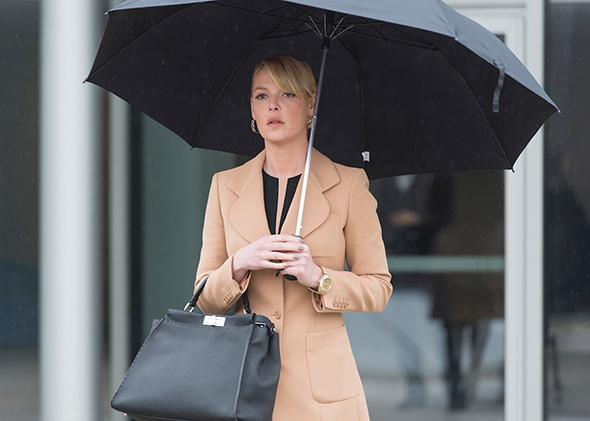Television has recently become a surprisingly welcoming home for the so-called “unlikeable” female protagonist, the flawed woman who is not cheerfully appealing to every single person who watches her. Olivia Pope, Carrie Mathison, Alicia Florrick, Hannah Horvath, Mindy Lahiri, and Valerie Cherish are just some of the characters who are fascinating to watch but who might be more than a little prickly over a super-sized glass of red wine. (Sure, drinking with Olivia sounds fun, but she would be curt and distracted and completely unwilling to dish about the sexual habits of POTUS.) But even as complicated women have made steady inroads on screen, being female and anything other than “very likeable” off-camera remains a career-jeopardizing proposition. Just ask Kristen Stewart, Megan Fox, and, most especially, Katherine Heigl.
Heigl has been a working actress for more than two decades—she co-starred with Gerard Depardieu in My Father the Hero when she was 16—but she became widely famous for playing squishy-hearted surgeon Izzie Stevens on the surprise hit Grey’s Anatomy. The same year that she won an Emmy for that role—and corrected the announcer’s pronunciation of her name—she co-starred in Judd Apatow’s Knocked Up, immediately becoming a movie star and almost just as immediately starting to behave in lively, impolitic, and professionally-suicidal ways. She called Knocked Up sexist. She pulled herself out of the Emmy race, saying that her material on Grey’s hadn’t been good enough to warrant it. Knocked Up may be a little sexist and Grey’s that season did have her giving CPR to a deer, but Heigl was airing dirty laundry, which, in Hollywood, you don’t do. She ungratefully, not to mention unshrewdly, insulted the very people who had helped her (Judd Apatow, Shonda Rhimes) in the pages of magazines. She earned a bad reputation.
For a brief period, it didn’t much matter. Heigl followed Knocked Up with a couple of romantic comedies that were hits and very messily extricated herself from Grey’s Anatomy. She had enough clout to get a movie green-lit just by signing on to the script. But at some point her persona and the string of uninspired rom-coms she was starring in caught up with her. Heigl has always come across as likeable on screen; she has that old-fashioned, self-deprecating “relateability” and a disarming guffaw working for her. But she had very effectively made herself totally unlikeable off of it. Her career floundered. And so four years after doing everything she could to get off the TV show that made her famous, Katherine Heigl, demoted movie star, is back on television.
Heigl is starring in NBC’s State of Affairs as the laughably named CIA analyst Charleston Tucker. Charlie, as she is thankfully known, puts together the president’s daily CIA briefing, a job that, in the world of the show, gives her influence over policy: If it doesn’t go in the briefing, President Constance Payton (Alfre Woodard) won’t act on it. But Charlie has undue influence for other reasons. She was engaged to President Payton’s son Aaron, a humanitarian aid worker who was killed in a terrorist attack on his and Charlie’s convoy in Kabul one year ago. In the pilot, a doctor is taken hostage by a group that intends to behead him. Almost simultaneously, Charlie learns that a U.S. military team thinks it might be able to nab the terrorist responsible for Aaron’s death. Will she save the doctor or pursue vengeance? And can she get away with deciding this on behalf of the president?
State of Affairs is just the first of three dramas developed by NBC this season that are heavily inspired by Homeland. It is the only one that, thanks to its intense mixture of the personal and the political, the White House, and the presence of a black woman in power, calls to mind Scandal. (If you listen closely, you can probably hear the cackling coming out of Shondaland.) And while it is completely watchable, it is also, unlike Scandal, not distinctive in any way. Like every network drama at this point, State of Affairs mixes a crisis-of-the-week story with a longer-term mystery: Charlie is getting texts from an unknown source about what exactly happened in Kabul. Like Carrie and Olivia and their ilk, Charlie’s professional life is aces and her personal life a mess. She numbs the pain with casual sex and alcohol, though wine is not her beverage of choice. And, of course, she is keeping a big secret.
That secret actually bodes well for State of Affairs. When I first watched the show’s pilot over the summer, I thought, “Well, there is a resoundingly mediocre television show.” But a number of changes have been made in the ensuing months, and though the version of the show airing tonight is not striking enough to actually be good, it is so vastly improved from the original version that it made me hopeful the series is on an upward trajectory. Horrible clunking lines like “I’m a mess in my personal life, but a sniper in my professional one” have been removed. Dull sequences have successfully been made more suspenseful. And the episode’s last-minute big reveal has been completely rewritten—it is now much more promising.
It’s promising because it calls into question Charlie’s competence. Throughout the episode, State of Affairs circles very gently around the question of her (and Heigl’s) likeability. Yes, Charlie is the kind of person who would size up a new colleague and say, “You’re very handsome. And old.” She is also a Duke Blue Devil. (A strike against, in case you’re wondering.) And another colleague refers to her as a PITA: a pain in the ass. But she’s still played by Heigl, and despite her poor choice of projects and off-screen reputation, Heigl has always been appealing on screen: She’s sharp, she’s funny, she’s wounded in unalienating ways. But the pilot’s big reveal suggests Charlie’s got flaws we haven’t seen yet, and if she does, maybe—just maybe—State of Affairs will be more than it seems, too.
